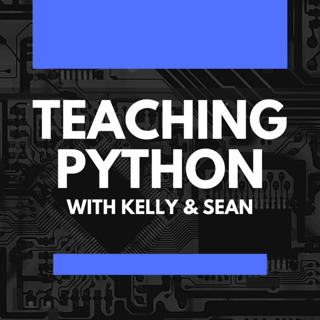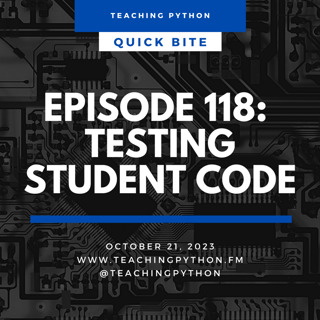
Episode 118: Quick Bites: Testing Student Code
Today, we'll talk about how to test students' code using automated tools. For example, the unit testing built into Replit's Teams for Education (https://replit.com/site/teams-for-education) allows students to see if their code is correct, while teachers can quickly assess dozens of submissions. We'll also talk about potential pitfalls that can disrupt or distract from learning. Note: This is a shorter episode format that focuses on one specific topic, limited to 15-20 minutes.
21 Loka 202315min
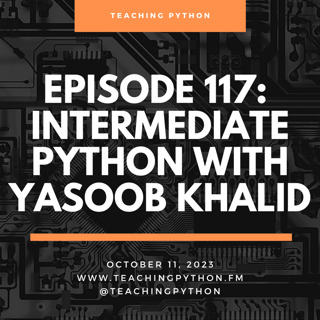
Episode 117: Intermediate Python With Yasoob Khalid
Yasoob Khalid is a blogger, developer at Microsoft, and author of Practical Python Projects and Intermediate Python. Growing up in Pakistan, he saw that there was a lack of resources for learners in developing countries, so he started to blog about what he was learning. Over time, this grew into free online books and resources that anyone around the world can use to learn Python. During our conversation, we talk about everything from making learning open and accessible, to the role that teachers and mentors play in our learning, as well as the ability to write and publish what we learn to improve our own understanding. We even sprinkle in a bit of Club Penguin. Join us to learn about how to go from basic to intermediate Python and so much more. Special Guest: Yasoob Khalid.
11 Loka 202358min
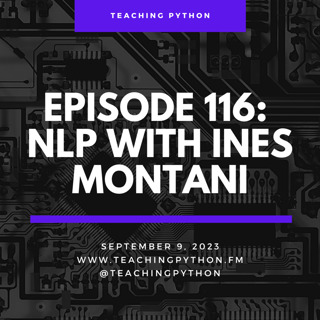
Episode 116: NLP with Ines Montani
This episode dives into the multifaceted realm of Natural Language Processing (NLP) with a guest expert, Ines Montani (#). The discussion revolves around the use of Python in the context of NLP, the complexities of language, the design of label schemes, and how educators and students can dive into this intriguing area. The conversation also touches on tools such as Prodigy (https://prodi.gy/) and Spacy (https://spacy.io/), as well as practical applications, including a humorous digression on the popular game, Fortnite (https://www.epicgames.com/fortnite/). Teachers are encouraged to explore NLP with their students, emphasizing the importance of hands-on experience and data annotation. There's also a mention of a fascinating project involving a "magic mirror (https://www.raspberrypi.com/tutorials/how-to-build-a-super-slim-smart-mirror/)" powered by Raspberry Pi (https://www.raspberrypi.org/). Special Guest: Ines Montani.
9 Syys 20231h 2min
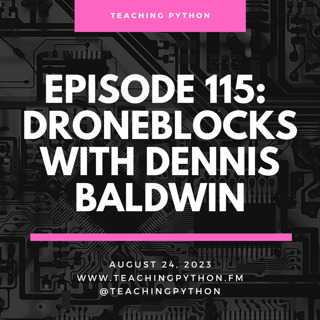
Episode 115: DroneBlocks with Dennis Baldwin
In this captivating episode of Teaching Python, Kelly and Sean sit down with the innovative mind behind DroneBlocks.io, Dennis Baldwin. As a child, Dennis was deeply fascinated with remote control cars and airplanes. That childhood passion translated into a profound interest in engineering, as he delved deep into the intricate world of building, wiring, and programming flight controllers for his RC planes and quadcopters. Alongside, Dennis maintained an active presence on YouTube, making sure to share a majority of his research, development, and findings with an eager audience. 2010 marked a pivotal year for Dennis when he discovered the ArduPilot project and was deeply inspired by the dynamic developer community that supported it. This newfound inspiration set him on a journey of countless hours in the garage, experimenting and constructing a myriad of autonomous drones. This includes everything from hexacopters and VTOL aircraft to delta wings and mini quads, leveraging APM and Pixhawk flight controllers. 2014 saw him crossing paths with Marisa at Walnut Springs Elementary School in Dripping Springs, TX. A chance collaboration led to Dennis introducing students to the wonders of quadcopters, which further transitioned to the integration of DJI SDK upon students' intrigue in aerial photography. Fast forward to 2015, Dennis established a groundbreaking concept—melding block programming with the DJI SDK. This innovation birthed DroneBlocks, a platform cherished by students for its intuitive approach to conducting autonomous missions with DJI hardware. Today, DroneBlocks boasts an app, a comprehensive curriculum, and an ever-growing community of users sharing their mission code globally. As a graduate from The Citadel with a BS in Electrical Engineering and with a rich history of co-founding multiple tech ventures, Dennis, along with Marisa, aspires to integrate DroneBlocks into every STEAM classroom across the world. Tune in and soar with us on this incredible journey of passion, innovation, and educational revolution. Special Guest: Dennis Baldwin.
24 Elo 202355min
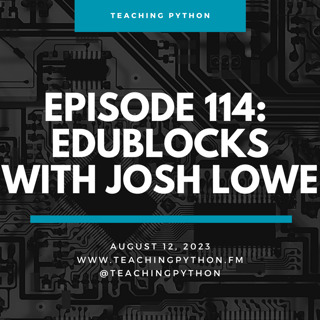
Episode 114: The EduBlocks Evolution and Josh Lowe
Way back on Episode 13 (https://www.teachingpython.fm/13), we interviewed Josh Lowe, then 15 years old and the creator of EduBlocks (https://edublocks.org/). When Josh was 12, he started a Saturday afternoon project to make a block-based coding IDE that generated Python code. Flash forward seven years and Josh still maintains EduBlocks as a software engineer on behalf of Anaconda (https://www.anaconda.com/). This week, Kelly and Sean caught up with Josh to learn about his educational journey since we last spoke with him, the latest developments on EduBlocks, as well as the new direction enabled by Anaconda's purchase of EduBlocks in May 2023 (https://www.anaconda.com/press/anaconda-acquires-edublocks-to-empower-k-12-data-literacy-and-expand-educational-offerings). Special Guest: Josh Lowe.
6 Elo 202351min
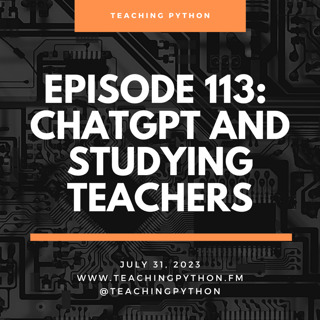
Episode 113: ChatGPT and Studying Teachers
This week we are joined by Philip Guo and Sam Lau, researchers at the University of California, San Diego. Philip and Sam have recently published research on how computer science instructors use artificial intelligence tools like ChatGPT and GitHub Copilot in their classrooms. Join us to learn more about the data behind how generative AI is changing the way we teach computer science and coding. Special Guests: Philip Guo and Sam Lau.
31 Heinä 202356min
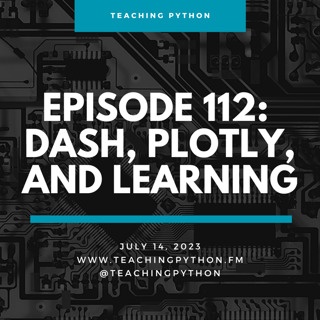
Episode 112: Dash, Plotly, and Learning
In this episode, Kelly and Sean meet with Adam Schroeder, community manager at Plotly and author of The Book of Dash. We'll talk about how teachers can use data visualization in the classroom with Dash to bring data to life for their students. If you're not familiar with the Dash and Plotly Python libraries, you can get started here with us! Dash is a library for building web-based dashboards to visualize your Python data. It uses Plotly, a library for making beautiful visualizations of data that are highly interactive. Both libraries are open-source and maintained by the Plotly company, which provides enterprise-grade implementations of Dash and Plotly for business customers. Special Guest: Adam Schroeder.
14 Heinä 202345min
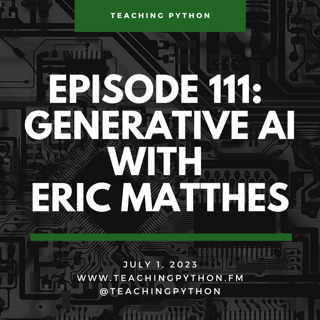
Episode 111: Generative AI with Eric Matthes
Episode 111: Exploring Generative AI in Education In Episode 111 of the Teaching Python podcast, join special guest Eric Matthes and your hosts Kelly and Sean as they dive into the intriguing world of generative AI in education. Coming fresh from the Education Summit at PyCon 2023, they provide a comprehensive recap of the event, highlighting the successful speaker topics, the ideal room size, and the engaging breakout sessions that made the summit a resounding success. As an extra resource, Eric Matthes, author of the widely acclaimed "Python Crash Course," joins the discussion, providing valuable insights into the intersection of generative AI and education. For those interested, Eric's book can be found on Amazon (https://amzn.to/3pz7uje). The conversation then delves into the complexities surrounding generative AI, emphasizing that while it holds tremendous potential, it is still in its early stages, leaving us with more questions than answers. To lay the groundwork, the hosts define generative AI and demystify how large language models work, drawing an analogy to refrigerator poetry magnets to aid comprehension. As the discussion unfolds, Kelly, Eric, and Sean raise crucial questions about the role of generative AI, specifically ChatGPT, in education. They explore the optimal level of usage, the necessary policies and governance to support its implementation, and draw parallels to the concept of the "Goldilocks zone" in astronomy, seeking the right balance for effective integration. The episode moves to thought-provoking dialogue regarding the future proficiency levels required for learners in problem-solving scenarios. They examine whether coding proficiency alone will suffice or if learners will need to develop AI literacy, enabling them to harness the power of AI to generate code and solutions. Tune in to Episode 111 of the Teaching Python podcast to gain a deeper understanding of the implications and potential of generative AI in education. As the hosts explore the evolving landscape, they shed light on the importance of finding the right balance and preparing learners for the challenges and opportunities that lie ahead. Special Guest: Eric Matthes.
1 Heinä 20231h 4min
